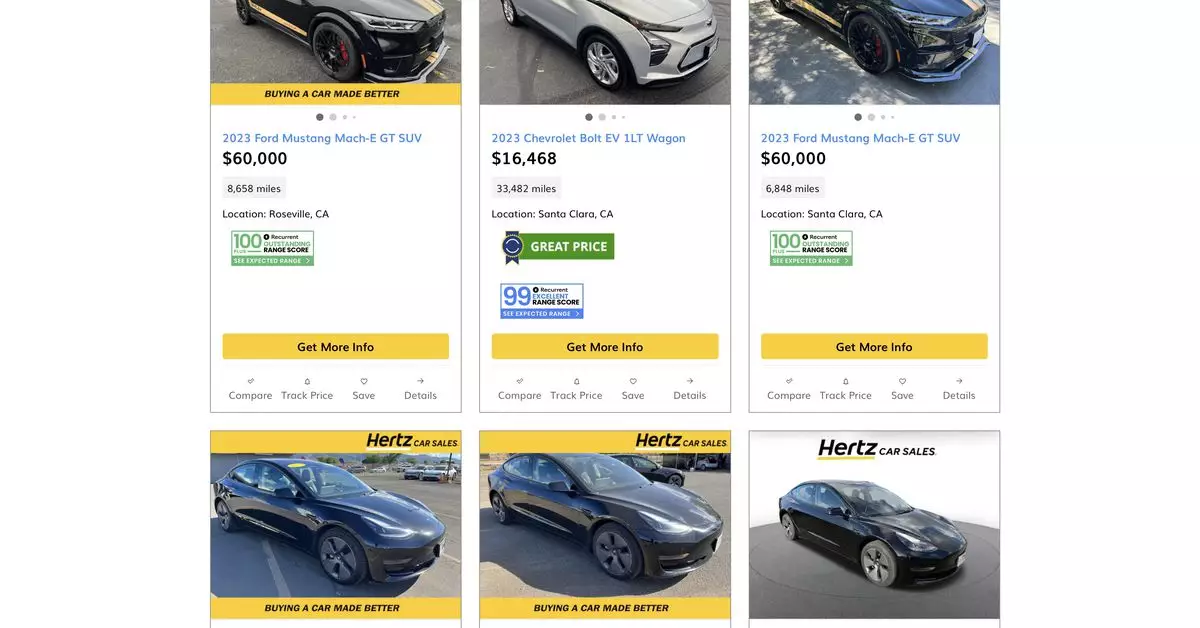In a notable move within the rental car industry, Hertz has begun reaching out to numerous electric vehicle (EV) renters with enticing offers that allow them to purchase the vehicles they’ve been renting. This strategy appears to target customers who are engaging positively with electric vehicles, providing a pathway to ownership. Recently reported cases detail how Hertz is offering rental prices for various electric vehicles, like the Tesla Model 3, that resonate well with the current market valuations. For instance, a renter shared their experience on Reddit, noting that they were presented with an opportunity to buy their 2023 Model 3 for approximately $17,913, closely aligning with prices found on Hertz’s own sales platform.
Interestingly, the deals presented by Hertz do not appear as random but seem calculated based on the specific mileage of the vehicles involved. In contrast to the reported asking prices for similar vehicles on the market, the renters noted that their cars, despite having around 30,000 miles, are still perceived as competitive deals. Another renter mentioned a 2023 Chevy Bolt being offered for $18,442, and a Polestar 2 for $28,500. These prices—while offering limited warranties—indicate both a shift in Hertz’s marketing strategy and an adaptation to buyers’ expectations in the used EV market. The inclusion of a 12-month, 12,000-mile powertrain warranty and a buy-back option within seven days adds a layer of consumer protection that may appeal to hesitant buyers.
Reassessing Fleet Electrification Goals
Despite these encouraging sales efforts, Hertz’s past ambitions to spearhead the electrification of its rental fleet have faced challenges. The company had initially aimed for a more extensive adoption of electric vehicles but had to recalibrate its strategies due to slower-than-expected customer demand and repair complications with certain models, such as the Tesla Model 3. Furthermore, it decided to halt further purchases of Polestar 2 vehicles, solidifying a trend of cautious steps as it navigates the electric vehicle landscape.
In a statement, Hertz communications director Jamie Line acknowledged that the current endeavor—linking rental customers to sales opportunities—has been part of a longer-term strategy to raise awareness about their inventory for sale and cater to renters who might be interested in ownership. This mingling of rental and sales channels not only enhances customer engagement but also reflects Hertz’s adaptability in a rapidly changing vehicle ecosystem, where both electric vehicles and the approach to their sales are evolving.
As the automotive market progressively shifts towards electrification, Hertz’s dual strategy of offering rental vehicles for purchase could prove to be a significant asset. It enables the company to maintain relevance in a competitive landscape while simultaneously addressing buyer concerns regarding EV ownership. Such flexible purchasing options might not only convert renters into buyers but also serve to enhance their overall customer experience. Whether this approach rejuvenates Hertz’s presence in the EV market remains to be seen, but it undoubtedly reflects an awareness of current consumer tendencies and an effort to foster long-term relationships through innovative marketing interventions.

